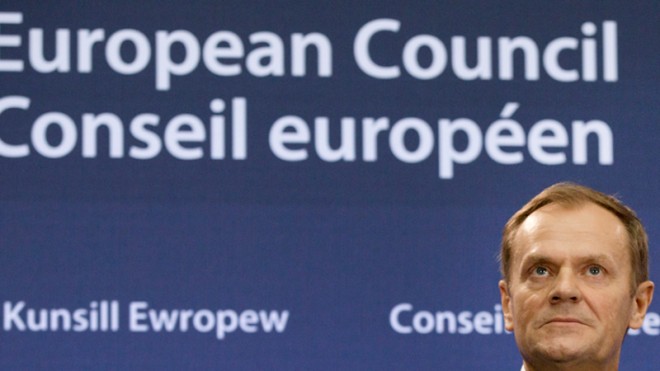
Incoming European Council President Donald Tusk listens to an introduction during a handover ceremony for the European Council Presidency at the EU Council building in Brussels on Monday, Dec. 1, 2014. Poland’s former prime minister Donald Tusk is pushing the EU’s center of political gravity eastward by taking over the EU Presidency from Belgium’s Herman Van Rompuy. Monday’s transition ceremony highlighted the increasing power of Poland within the 28-nation EU and further shift from a west European economic association to a strong political body uniting some 500 million people from Britain to the borders of Russia in the east. (AP Photo/Virginia Mayo)
BRUSSELS — The European Union is taking a big step toward giving EU member states the power to ban the cultivation of genetically modified crops even if they have been approved by the food safety authority of the 28-nation bloc.
The European Parliament and member states agreed Thursday that national governments can have the final say in the matter — a move that goes counter to many EU initiatives, which traditionally seek a common stance on EU policies.
EU Food Safety Commissioner Vytenis Andriukaitis said member states “can take into account their national context and, above all, the views of their citizens.”
The measure still needs final approval from the parliament and member states over the coming weeks but EU officials said that no longer poses a substantial problem after Thursday’s agreement.
“Citizens, farmers and industry finally get legal certainty, said Peter Liese, a parliamentarian from the EPP Christian democrat group.
Under the broad agreement, member states will have to get a special opt-out for every GM crop they seek to ban. Other member states must make sure that pollen or seeds do not inadvertently drift into nations that ban them.
The EU has tried to come up with a unified rulebook for the past four years but the issue has proved so divisive it was impossible to find a breakthrough until now.
Environmental groups still consider the proposed text less than watertight and fear that agribusiness multinationals will be able to challenge a national ban in court.
The EU has strict guidelines on authorizing and informing consumers about foods containing GMOs — a policy that has caused problems for producers of genetically modified seeds such as the U.S.-based Monsanto Co., which are used to less stringent rules around the world.
Only one GM crop is planted in the EU so far, predominantly in Spain.